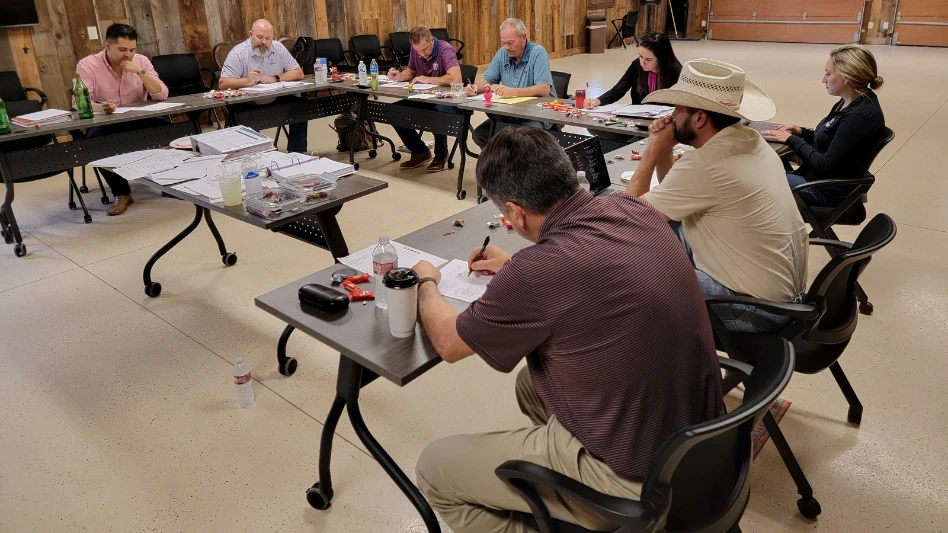
Dr. Jermaine Davis remembers conversations with his mother fondly.
When she passed away in 2005, he spoke at her memorial service and recalled that he could go to her with anything. But he admitted that if an old adage is true – that if the only tool you have is a hammer, every problem is a nail – she wielded her voice like a jackhammer.
Davis said that even today, when someone yells or curses at him, he shuts down. But the problem is that he naturally gravitated toward that communication style, and it was something he had to shake when he started having kids.
“Great leaders, great supervisors – they have multiple tools so they can adjust. You can’t motivate everyone the same. People are different,” Davis said. “I want to have an open relationship with my son. If he makes a poor choice, I want him to open up and share it. But I know I have to earn that.”
Davis spoke at Lawn & Landscape’s annual Top 100 event in Nashville, Tennessee, where executives from the top landscaping companies nationwide attended to celebrate their successful years amidst a pandemic. And, in what Davis said was his first live presentation since the pandemic began, he told the attendees what he’s learned in 25 years of working in communication at Frito Lay, Keebler Cookies and IBM.
Among those lessons? Leading while trying to gain someone’s perspectives, even when you disagree, is the most effective way toward progress.
“When an individual is brutally honest, it can shut people down. I’m going to recommend you put some more tools in your toolbox so you can be more effective,” Davis said. “What if you were honest while being compassionate? It doesn’t mean you’re weak. It doesn’t mean you’re soft. I’m going to say it in a way where people hear you.”
WELCOME THE CONVERSATION. Davis said communication happens in one of three areas: someone’s private life with immediate family; someone’s personal life with close associates or friends; and someone’s professional life at work or in a particular industry.
Conversations in any of those arenas can turn contentious in a hurry, and Davis recommended putting a stop to it and implementing a few quick tactics to avoid the talk from spiraling completely.
“Next time you’re having a conversation that’s going south, be mature enough to say, in your own words, ‘hey, is this conversation working for you?’” Davis said.
Davis recommends asking:
- “Is this conversation working for you?”
- “Would you like for it to work for you?”
- “What’s one thing you need from me to make this conversation work for you?”
As for identifying when those conversations need these tactics, Davis said it’s important to acknowledge the productivity of the talk. There’s a major difference between dialogue and debate.
“A dialogue is an exchange between you and your stakeholders. They share, you share, and then you make sense,” Davis said. “But in a debate, there’s yelling, screaming, jockeying for position. It drains people. When people are drained, (there’s) no motivation to do the work.”
RULES OF THUMB. Davis said he practices a carpenter’s golden rule: measure twice and cut once. In other words, he says know your goals – reaffirm your goals – and then make decisions.
Additionally, he also said establishing trust with your teams to help accomplish those goals is essential. Particularly as business leaders, making sure that employees feel empowered helps drive them toward effective communication.
“When people trust us, do you know what happens? Communicate goes up,” he said. “When people trust us, they take more risk. When people trust us, they open up more. When people trust us, they share their creative ideas. When they don’t trust us, they hold back. They’ll watch the organization tank.”
Finally, Davis also told attendees that when a “champion” loses a game, they go back and watch the game tape. They get feedback to review what went wrong. He recommends company leaders do the same thing several times throughout the year.
“Feedback is the breakfast food of champions,” he said. “Here’s how you position yourself for success next time.”
Latest from Lawn & Landscape
- Our February issue is now live
- All fun and games
- Larry Ryan steps down as Ryan Lawn & Tree president
- Session snippets
- WorkWave debuts WavelyticsTM at Beyond Service User Conference
- Picking up after the storm
- HD Hyundai Construction Equipment North America unveils HX90A compact excavator
- Ruppert Landscape acquires Ocean Woods Landscaping





